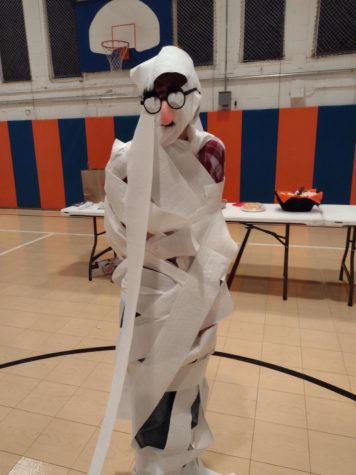Mr. Butler Speaks on the Past and the Future
The conclusion of the 2019 Fall Semester will mark Mr. Butler’s 41st year of teaching at Uni High. Every student who has passed through our school since he arrived remembers his flowcharts. Several things have changed since the first flowchart was memorized, though. According to Butler, the big difference between Uni when he first began teaching here and Uni now is that it used to be much more open. Butler said that Students didn’t used to need Prox Cards, which made practical jokes much easier.
One group of students in 1989 even had a key to the building, and were responsible for the football trophy that sits in our trophy case, said Butler. They entered the school over the weekend with a football they had run over with a car to make it seem older, fashioned a trophy out of it with the words “UNI 37, URBANA 3,” and placed it in the trophy case.
“And then, five years later, somebody noticed,” Butler said. “It’s the trophy I’m most proud of.”
As a history teacher, Mr. Butler sees some similarities between historical events and current events, but he knows that they are not perfect parallels to today and can’t suggest where we are going. “[As] Mark Twain said, ‘History doesn’t repeat itself, it rhymes’” Butler noted.
Still, there are several similarities to the past that Butler pointed out. He said, “We were divided like this before the Civil War, and I think we kind of came back together.” He attributes this to the wealth in the North in the late 1800s, saying “prosperity has a lot to do with making people nicer to one another.”
He worries, however, that this might be difficult as climate change begins to affect our economy, making us less prosperous. He gave some examples of current climate-related social problems.
“Some people say water is the oil of the 21st century. We’re already seeing people driven by drought… That’s basically what’s driving people from Central America here… Those are largely climate refugees.” Butler said.
He also attributes the civil war in Syria to a drought that drove people into cities. “[The cities] became a pressure cooker of problems and tensions that finally exploded in 2011…We need to be expecting more of that.”
When asked about how to solve some of these problems, he said that he hopes somebody moderate can come to power, unite both sides politically, and begin to fix some of the issues that we face. “It would take a lot of people skills,” Butler said. “It’s easy for me to say I’d do this, this and this, but, when you get in the driver’s seat, you find out it’s a very different road from how it looks in the back seat. Or if you’re in the trunk.”
